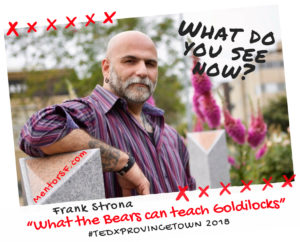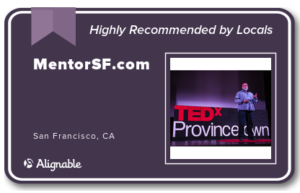Questions you might be asked
Questions you might be asked
These were some questions that previous speakers were asked. The content below is offered as a starting place to help you develop your responses. You are welcome to revise them to fit your style and voice.
Click here to return to the Speakers Support page and the three supplemental links; 5 Ways to Promote Your Talk, Questions You Might Be Asked and TEDx Sample Social Media Posts and Tips.
What is a TEDx?
-
- TEDx is a licensed TED event
- Dedicated to “Ideas Worth Spreading
- Locally and independently produced
- Finished videos can be searched on TED.com for a global audience.
TED is a nonprofit devoted to spreading ideas, usually in the form of short, powerful talks (18 minutes or less). TED began in 1984 as a conference where Technology, Entertainment, and Design converged, and today covers almost all topics — from science to business to global issues — in more than 100 languages. Meanwhile, independently run TEDx events help share ideas in communities around the world.
How does a TEDx differ from a TED Talk?
-
- They don’t. Both are TED-style events and presentations.
- TEDx events include live speakers and recorded TED Talks and are organized independently under a free license granted by TED.
- TheTEDxProvincetown speaker and audience experience is similar to a TED event, just done at the local level.
How did you get the gig?
Previous speakers answered this question:
“I was contacted by the TEDxProvincetownProducers, who presented the topic they were asking me to consider and the theme for the year. Then I participated in an interview process. Once I was invited, then I was asked to agree to the TEDX rules and TEDxProvincetownTimeline agreements”
“I saw a call for submissions and submitted a topic idea online at TEDxProvincetown.com. Then I received an email asking me to take part in an interview process. Once I was invited officially, I was then asked to agree to the TEDX rules and TEDxProvincetownTimeline agreements”
Is this the first TEDx out of Provincetown?
No. The first TEDxProvincetownwas produced on June 30, 2018, with 10 speakers. In fact, the playlist for 2018 can be found on the TEDxProvincetown 2018 playlist: https://www.youtube.com/playlist?list=PLmPWpLkF_IlNTYAlm97-l56XRLY1zhHaK or by searching the TED.com website for TEDxProvincetown
For TEDxProvincetown 2019 who are the speakers?
The Producers of TEDxProvincetown found 8 speakers with clear Provincetown and Cape Cod ties and relevance. They include voices from science, art, social sciences, advocacy, and entertainment. A full roster is here: http://tedxprovincetown.com/2019-presenters/
What is the theme for 2019?
“Step Up” to TEDxProvincetown 2, attempting to answer these “big ideas”
-
-
-
- What does it mean to be engaged? To “step up”?
- What is progress or improvement?
- If not a solution to an issue, then what raises the bar… takes that next step?
- What’s the next step – in science, art, culture, gender, and performance?
-
-
*These are talks “from Provincetown”, not necessarily “about Provincetown.”
What benefits or other assets did you get for participating in a TEDx?
-
- None of us are paid to perform.
- The speaker themselves form an informal cohort effect. Widening our individual networks and relationships. Some of our 2018 cohorts have actually gone on to create several joints projects.
- Shared media is another big asset – cross-promotion and tagging on social media widen the speaker’s networks and increases exposure and audience.
- The TEDx production team has volunteers who assist in speaker development, production, marketing, and outreach.
Best of all– TEDx goes wide on the official TED.com YouTube channel with 20M+ subscribers, Successful TEDx Talks can get picked up at the main TED.com platform.
What if any lessons learned did you take away from the TEDx experience?
A few ways some previous years speakers responded:
“Clearly understanding the impact, a well-crafted talk can make to people you may never meet was huge for me. After the talks went live, I received messages and comments from all over the world.”
“A TED style talk is not the same as a presentation. You have to relate to the audience from the stage without a podium or notes to hide behind.”
Why did you do it?
A few ways some previous years speakers responded:
“it was an opportunity to share my experience in a format that would appeal to thinkers and change-agents in an arena larger than I would be able to reach alone”
“It was my own brand of activism. Helping me share themes that are often overlooked or hidden because of bias, phobia and fear”
I would love to do a TEDx talk. How do I engage with TEDx Host/Organizers for success?
-
- 100% of potential speakers underestimate the time, focus and effort to produce a TEDx talk. Make sure you have the bandwidth to maximize the opportunity — minimum 200 hours to write, develop and rehearse a talk.
- Be clear with your abilities and limitations. On a personal note, be ready to check your ego at the door. A during the crafting process, a lot of people will weigh in with notes and suggestions about how to improve your talk, even if you think it’s perfect.
- Create an idea that is “worth spreading” and that you have the authority to present it.
- Make sure your idea is fresh in the TED universe. Know your existing competition on the topic.
- Be inspired by the topic but bring your expertise and unique perspective.
- Be clear what your “big idea” is for the theme of the talk, how it might be presented and how it will engage the audience in the theater and via the video.
- Ask for what support they plan to offer (coaching etc). Note: Talks are not paid but you get to use the talk in your branded websites. Some may cover you travel.
- Most talks are “off book”. That means you should be ready to have your talk memorized and a final script ready before the day of the show.
- Ask what equipment will be available. Not all equipment may be available. Some may have stage monitors, or laptops. Etc.
- Memorize and stay on the script as much as possible
The difference between Storytelling and a TEDx Talk
-
- TEDx talks are not MOTH talks, or lectures, or SLAMS.
- TEDx talks are much more scripted and are difficult to “wing”. Especially since they need multiple versions are recorded and may be edited together for a cleaner final version.
- The production of staffing and requirements are far greater. (TED rules call for a five-camera set up, for example…). So memorization and preparation is important.
- They both tell a story – but TEDx’s play well in a visual text form as well – when they are transcribed and captioned – single lines and sounds bites are linear and flow taking the listener to a specific moment.
What is the structure of this kind of talk?
It really depends on the talk, but generally:
-
- Start with a “hard open” to your relationship with the topic, then begin the talk.
- Keeping in mind that the opening should be descriptive yet not overwhelming, interesting but not so dry that people loose interest.
- Have clear “take home messages” — maybe three, depending on the topic — that make your audiences smarter on your topic.
- Illustrate your professional expertise balanced with the human “story” to tell.
- Think visually – even if you aren’t using slides or video – your words need to be descriptive.
- Keep visuals to fewer than 8 slides — or negotiate something more with the producer if the talk would be better for it.
- Have a great close that ends the talk as strongly as you began it.
Are there ways to leverage it into other venues?
-
- TEDx talks are produced under non-commercial Creative Commons licenses– so that they are shareable.
- Once the talks are live, promotion is key to increasing viewership.
- Finished talks can be translated by an army of volunteer translators. This helps in building a global audience.
- Speakers are encouraged to sponsor social media posts (boosts) to get the links to key audiences and stakeholders
Did anything surprise you? What was unexpected?
A few ways some previous years speakers responded:
“How generous and open the audience is. They come to the event knowing it will be filmed and that sometimes a presenter may be nervous or a glitch might occur that means a restart – but they helped keep the energy high and fresh”.
“The personal nature of the responses from those in the audience afterwards. People wanted to talk and reach out to the presenters. In those moments, while on stage – we “touch” the listener and they respond with appreciation, respect and a sense of belonging.”
“The amount of time and effort for a 9 – 12 min talk. It takes more time and planning than your average conference presentation. Practicing and awareness of me own style, inflection and confidence was important. Even the ability to memorize and delivery was something I had to practice”.


